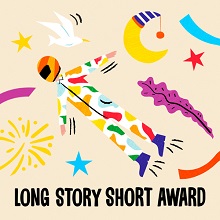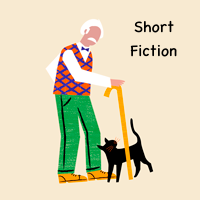Each morning his face flushed as he remembered the boy's words, "I want that shovel. It's just like yours." And each morning he fell to his knees, extended his arms, then plunged his hands into the ... [+]
The house on Eleventh Street boasted a stout reputation of being haunted. Mr. Scott Reynolds, a skeptic by nature and a cynic by nurture, did not believe in ghosts.
The first incident occurred around 1am on his sixth day in the residence. Scott was doing some light reading on the papal styles of Pope Urban II. He wasn’t religious, just curious.
A sound echoed from the parlor, a short blaring of an instrument.
Scott set Pope Urban on his nightstand. There it was again. Low and honking and horrid.
He perched his eyeglasses on his nose. Next went on his slippers, a practical brown, and the matching robe. The sound came again, an ear-splitting tootle that shook his bedroom door.
Scott snorted. What an abominable noise! He snatched a golf club from his closet and yanked open his bedroom door. Club in hand, he marched downstairs, determined to put an end to the racket. He turned into the parlor. His face blanched at the sight before him.
A transparent woman sat on his grandmother’s antique rocking chair, playing the bassoon. She looked up when the golf club tumbled from his hand.
“Hello there,” she chimed.
He rubbed his eyes, certain they deceived him. “What are you doing in my house?”
Her brow knitted together. “Your house? Why, this is mine.”
“Not so.” He stomped a foot.
“It is. I’m certain.” The ghost tossed her hair. “I lived and died here.”
Died here? That couldn’t be. Scott seized his golf club from the carpet. The ghost eyed it, but returned to her bassoon.
What an odd dream! Even so, that treacherous sound would not do. “No, no!” he insisted. “You will not be playing that bassoon anymore in my house.”
With that, Scott tramped back upstairs and dove straight into bed, not even bothering to remove his slippers or robe.
Upon waking in the morning, Scott was certain the infernal woman was a hallucination of a wearied mind. He went about the rest of his week, working long dreadful hours in the accounting office, shuffling documents and inputting numbers. Oh, how he despised tax season!
Days passed and Scott had nearly forgotten all about the incident. He tucked himself into bed one night with a cup of tea and a quaint book on porpoise migration.
A blaring noise arose from downstairs, startling the cup from his hand and spilling tea all over his silk pajamas. He dabbed at his shirt with a blanket, cursing.
The wail of a bassoon came again, a treacherous melody in the likes of Mary Had a Little Lamb.
Scott sat up, back straight as a telephone pole. He shook his head. It was a dream. And yet?
He flew down the stairs and into the parlor. There sat the woman, a glowing specter in the moonlight. She blew her bassoon, eyes closed and body swaying.
Scott pitched the porpoise book. It flew straight through her, thudding against the wall.
She glanced up. “That wasn’t very kind.”
“Leave my house!”
She smoothed her dress. “No, thank you.” She picked up the bassoon again.
Scott clapped his hands over his ears. A nightmare, but a living one! How could he escape?
There was none.
For many nights, the bassoon reverberated from the parlor, and he resisted the urge to stomp downstairs and complain to the apparition.
One evening, after a particularly vile day of accounting, Scott tossed and twisted in his sheets. He loathed his colleagues. He detested his clients. Yet, he had no friends or family with which to share his grievances. No one at all.
Then he heard the bassoon player.
He stared at the ceiling in the dark, listening to the clanky tune.
He’d never enjoyed the company of another, and the feeling appeared to be mutual among his associates. Yet, this odious ghost returned no matter what he said. Perhaps, she’d listen to his quibbling.
He ambled down the stairs.
The ghost smiled at him from the rocking chair. “Hello. It’s been quite some time.”
Scott sidled along the wall. “Yes, some time indeed.”
“What is your name?”
“Scott Reynolds. And yours?”
“Mary Lou.” She leaned forward. “Do you live alone, Mr. Reynolds?”
“Yes, of course. Anyone else would’ve been driven to madness by the sound of your wretched bassoon.”
“Oh, you are a funny man.”
He slumped onto the couch, an ugly plaid thing. “I’ve had an awful day and I came down seeking company.”
Mary Lou tilted her head. “My company?”
“Certainly not.” A lie.
“I see.” Her slim fingers traced down her bassoon. She blew out a strand of random notes.
Scott threw an arm over his face. “You have no talent.”
“That’s what my mother told me. I will prove her wrong.”
“Is that why you refuse to go on your merry way to hell?”
“Precisely.”
Scott scowled. Stubbornness. What an unattractive quality in a woman.
“Well,” Mary Lou remarked, “you are welcome to not seek my company any night.”
He slumped deeper into the couch, considering the offer. He did, indeed, feel better after confiding in the woman. Perhaps, he would wander downstairs more often.
And he did.
Nearly every night, Scott would perch on that hideous couch, read a book, and wait for Mary Lou. She’d appear with that lilting smile of hers and practice her bassoon. The conversation was stilted at first. They largely ignored one another. Not that Mary Lou was a poor conversationalist, simply that Scott knew not how to commune with the living nor the dead. He’d lived nearly thirty-five years without a friend. He didn’t know where to begin.
That was, until Mary Lou began asking him about his reading. He found he could speak plenty about his books, incessantly actually. She didn’t seem to mind his long-winded tangents on plague statistics or the Bermuda Triangle.
Mary Lou turned out to be an excellent listener.
Her company went from unbearable to congenial. Even her bassoon playing had its charms. Scott liked the way her fingers danced across the keys of the instrument. She wasn’t good by any means, but he liked it all the same.
Many months later, Scott lounged on the couch, head bobbing in tune to the music of the bassoon.
Mary Lou halted her playing. “Are you dancing, my darling?”
He froze. “No.”
“You almost seem to be enjoying yourself, but that can’t be so. You detest everyone’s company.”
“Yes, well-” His voice went hoarse. “I don’t detest your company.”
There it was. The words were out there in the great, dreary world. He never imagined finding companionship with anyone, much less a ghost.
“You charmer,” Mary Lou clucked. “If only you played the cello, then we might form a band.”
He barked a laugh. “We would be terrible.”
“We would be wonderful.”
“Correction then. I’d be terrible. You -” He struggled for words. “You’re a brilliant bassoon player, my dear.”
With that utterance, the aura of the room shifted, as if a gust of frigid air blew in.
Mary Lou set aside her bassoon, blank faced. “Thank you.”
Scott stood as a shiver caressed his spine. “What’s wrong?”
She walked to the window in a trance. The house’s moody tone lifted all at once, like a cage releasing a dove.
“Where are you going?”
“The other side,” Mary Lou said softly.
“Wait.” He didn’t want her to go. Not now. Not ever.
“I’ve found peace here with you, Scott.” Those lovely eyes grew tearful, staring out at the stars.
“Then stay.”
“That’s why I can’t. This peace, it means I must move on.” A tear slid down her cheek. “We won’t be apart forever.”
“I don’t wish to be apart at all.”
“Goodbye, Scott.” Her ghostly form wavered, then vanished.
Scott stood at the window a long while, staring up at the clear night sky, confounded by the irony of it all. Love brought them both peace, and that peace sent her away.
And now, he was alone.
But they wouldn’t be apart forever.



